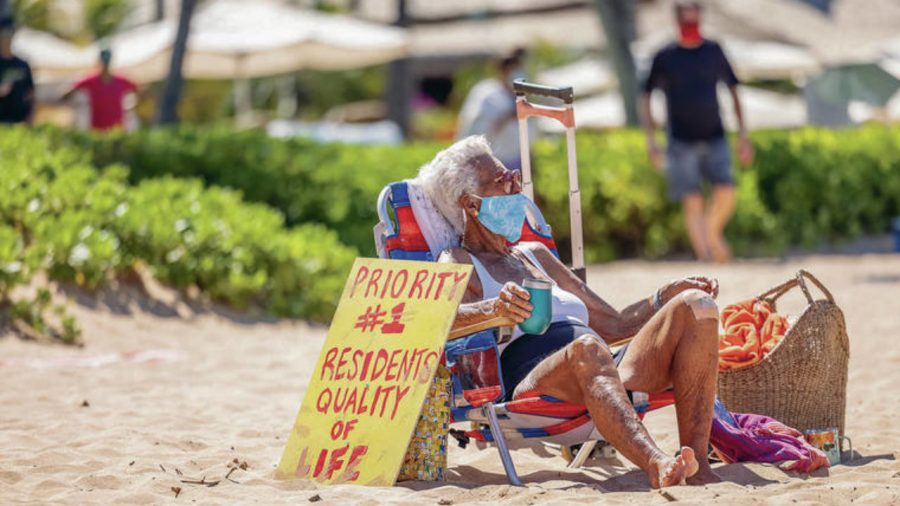The Impact & Colonial Legacy of Mass Tourism on Native Hawaiian Residents
Native Hawaiians struggle to manage the effects of the immense number of tourists in an effort to preserve their economy and cultural heritage.
Kihei local Dorothy McCoy, 93, found a spot on Wailea Beach for the “Take Back Our Beach” event organized by residents to push back against the resurgence in tourism.
With picturesque islands and rich cultural heritage, the beautiful state of Hawaii has become one of the most popular tourist destinations in the world today. The islands have been famous since their ‘discovery’ by Europeans in the 18th century, popularized for their year-round warm weather and gorgeous beaches. As the islands historically drew in more and more vacationers, small businesses were developed to cater to visitors, and the economy essentially was shaped around the interests of tourists. Their tourist-focused economic structure has certainly offered benefits to the economy of the islands, but it has also created the basis for many of the conflicts Hawaii faces today—conflicts that have led natives and other locals to lobby for limited and sanctioned travel to the islands.
Busy beaches and tourist attractions are not the main concerns of Hawaiian citizens who wish for fewer influxes of travelers. Tourists have a large, direct impact on locals as they use up limited resources on the islands while “crowding the island and driving up prices,” according to those studying the issue. As much as small businesses depend on the tourism industry to sustain themselves, the popularity and the amount of money cycling into the islands push sellers to increase their prices. Many native Hawaiians therefore cannot afford to pay these high prices for goods and services that are often also used up mostly by tourists. The constant influx of people visiting the islands also results in a shortage of goods like groceries and gasoline that are day-to-day necessities for everyone. The difficulty to find and purchase these goods consequently angers locals who struggle to fulfill their everyday needs. But these issues are not the only problem.
One of the underlying issues of the tourist industry is its history of colonialism. Stolen land and the eventual annexation of the islands resulted in a suppressed Hawaiian culture following the arrival of European settlers. With the arrival of foreigners came their unrelenting advances to diminish and reduce their heritage, and such initial actions have left a lasting imprint on the culture of today’s native Hawaiian people. The history of whitewashing and having their native cultural beliefs and practices suppressed has caused native Hawaiians to face issues of internalized racism, scaring many parents into keeping their culture from their children and hiding it from outsiders to protect their families.
One native Hawaiian writes,
Native Hawaiian culture has been long pushed aside and seen as unimportant due to early European influence. And today, the tourism industry is only a reflection of the terrible treatment of native Hawaiians throughout this tainted history.
The problems with such high numbers of tourists are now only made worse since the Covid-19 pandemic began. Strikingly, there has been a 17% increase in hospitalizations across the islands since travel to the islands was permitted this past June. As tourists begin to crowd Hawaii once again, the hospitalization rates during the pandemic have increased as mainlanders unknowingly spread the virus to locals. Additionally, due to Covid, numerous jobs have been lost and businesses have been shut down. Now that tourists are returning, Hawaii simply isn’t prepared to cater to them, providing necessary guardrails, infrastructure, and protection that is far easier to come by on the mainland.
The tourism industry has shaped the economy of the islands, yet the problems stemming from it have only grown worse and are now near impossible to fix. In the limited time that we have before this situation becomes irreversible, Hawaii must take action to address its flood of tourists in order to protect the livelihoods and living conditions of native Hawaiian locals.


